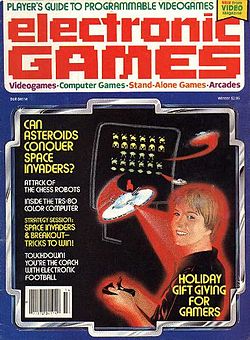On September 4th, the video game industry lost a true pioneer. Bill Kunkel, founder of Electronic Games magazine and longtime video game journalist, passed away at the age of 61.
Kunkel began his career writing comic books and covering the wrestling industry, but he made his greatest impact as a journalist chronicling, celebrating, and critiquing video games. Over the years he worked on numerous publications, designed games and taught about them, and in 1981 cofounded, with Arnie Katz and Joyce Wetzel, Electronic Games magazine.

Electronic Games was the first video game magazine in the United States. General-interest computer periodicals such as Creative Computing often covered games, and Kunkel and Katz had written the “Arcade Alley” column for Video magazine, but until Electronic Games, no publication devoted itself solely to the art, creation, and people of video games.
Kunkel, Katz, and Wetzel worried that readers wouldn’t embrace the magazine, but it caught on at once. Kunkel recalled in his autobiography, Confessions of the Game Doctor, that after the first issue came out, “We got word that the newsstands were calling the distributors. Apparently the magazine sold out quickly and as word spread through the nascent gaming underground, fans of games electronic began demanding copies. So, more were ordered and the first issue alone pretty much established us as more than just a one-shot.”

Under the byline of the “Game Doctor,” Kunkel moderated a Q & A column that became a regular feature of each issue. While his title was firmly tongue-in-cheek, his answers to readers’ game questions proved straightforward and helpful. More importantly, as editor, Kunkel expanded the vocabulary of video games, coining or popularizing terms like “playfield,” “scrolling,” and “screenshot.” He also shaped the magazine’s mixture of industry news, game reviews, and reader feedback—a content model that other video games magazines adopted. When reading some of the thousands of video game magazines in ICHEG’s collections—magazines that followed Electronic Games—it’s evident that these publications all bear witness to Kunkel’s vision of what a video game magazine should be.
People form communities by coming together and discovering common interests, building friendships, and airing opinions, ideas, and news; and Electronic Games provided such a forum for video game enthusiasts. Thanks to the work of Bill Kunkel, the magazine helped transform a collection of disparate players into a true community of gamers.
For that, everyone who loves video games should be grateful.
By Jon-Paul Dyson, Director, International Center for the History of Electronic Games and Vice President for Exhibits
 Hours 10 a.m.–5 p.m. | Fri. & Sat. till 8 p.m.
Hours 10 a.m.–5 p.m. | Fri. & Sat. till 8 p.m.